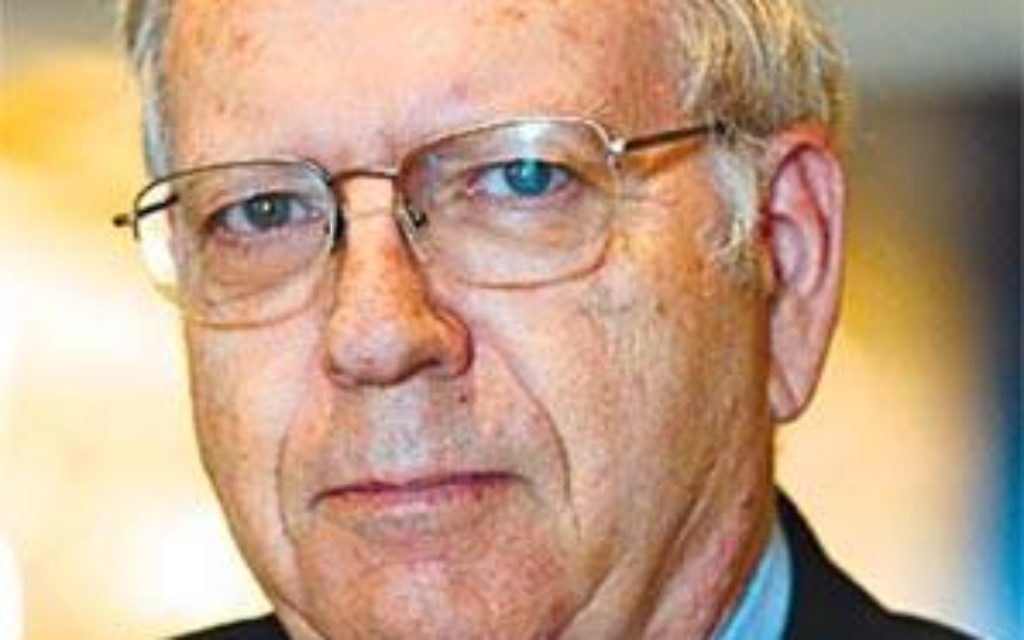Former head of Mossad says two-state solution is ‘least probable’
By Joe Millis
A two-state solution to the Israel-Palestinian conflict is the most desirable outcome but the least probable, according to the former head of Israel’s intelligence service Mossad.
And, Ephraim Halevy added, the most likely solution – a single state between the River Jordan and the Mediterranean was the least desirable.
Get The Jewish News Daily Edition by email and never miss our top stories Free Sign Up
But tempering that gloomy outlook, Hampstead-born Halevy – who was sharing a stage with Sir Richard Dearlove, the former head of the Secret Intelligence Service (MI6), at a Zionist Federation breakfast, noted: “I feel that, ultimately, an agreement [on two states] will be reached not because people will one day wake up and suddenly realise they have to embrace each other. An agreement will be reached out of dire necessity, because the alternative is worse than not making an agreement.
“The best thing [US Secretary of State John] Kerry could do at the moment is to do what a predecessor, Jim Baker, did, and return to Washington and tell both sides to give him a call when they are ready to be serious.”
In a wide-ranging talk on Middle Eastern and world issues – including Ukraine, Russia and Nigeria – the George Smiley-esque Halevy and Sir Richard were largely in agreement.
The former MI6 head (pictured), now master of Pembroke College, Cambridge, said that the “cold war between Sunnis and Shias has now turned very hot. Both Saudi Arabia (Sunni) and Iran (Shia) are pouring in huge amounts of resources into their respective proxies, Hezbollah and Syria on one side and Egypt and other Arab countries on the other.”
He added that at present, the “most important thing to realise was that not all problems can be resolved, and the best we can do is manage them so that they do not become full-blown crises.”
Both former spies noted that the coming big issue in the Middle East was the scarcity of food and water.
“Egypt and Iran both have populations of 90 million – double that of 40 years ago,” said Halevy.
“Food prices in both are skyrocketing and the water is drying up. That’s a recipe for disaster.”

Thank you for helping to make Jewish News the leading source of news and opinion for the UK Jewish community. Today we're asking for your invaluable help to continue putting our community first in everything we do.
For as little as £5 a month you can help sustain the vital work we do in celebrating and standing up for Jewish life in Britain.
Jewish News holds our community together and keeps us connected. Like a synagogue, it’s where people turn to feel part of something bigger. It also proudly shows the rest of Britain the vibrancy and rich culture of modern Jewish life.
You can make a quick and easy one-off or monthly contribution of £5, £10, £20 or any other sum you’re comfortable with.
100% of your donation will help us continue celebrating our community, in all its dynamic diversity...
Engaging
Being a community platform means so much more than producing a newspaper and website. One of our proudest roles is media partnering with our invaluable charities to amplify the outstanding work they do to help us all.
Celebrating
There’s no shortage of oys in the world but Jewish News takes every opportunity to celebrate the joys too, through projects like Night of Heroes, 40 Under 40 and other compelling countdowns that make the community kvell with pride.
Pioneering
In the first collaboration between media outlets from different faiths, Jewish News worked with British Muslim TV and Church Times to produce a list of young activists leading the way on interfaith understanding.
Campaigning
Royal Mail issued a stamp honouring Holocaust hero Sir Nicholas Winton after a Jewish News campaign attracted more than 100,000 backers. Jewish Newsalso produces special editions of the paper highlighting pressing issues including mental health and Holocaust remembrance.
Easy access
In an age when news is readily accessible, Jewish News provides high-quality content free online and offline, removing any financial barriers to connecting people.
Voice of our community to wider society
The Jewish News team regularly appears on TV, radio and on the pages of the national press to comment on stories about the Jewish community. Easy access to the paper on the streets of London also means Jewish News provides an invaluable window into the community for the country at large.
We hope you agree all this is worth preserving.
-
By Laurent Vaughan - Senior Associate (Bishop & Sewell Solicitors)
-
By Laurent Vaughan - Senior Associate (Bishop & Sewell Solicitors)
-
By Laurent Vaughan - Senior Associate (Bishop & Sewell Solicitors)
-
By Laurent Vaughan - Senior Associate (Bishop & Sewell Solicitors)
























